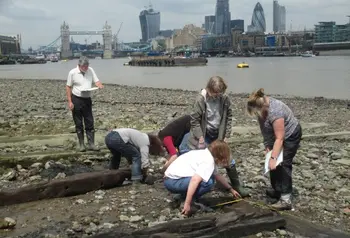HLF supports plans to record UK's coastal archaeology

CITiZAN, the Coastal and Intertidal Zone Archaeological Network, has been awarded £1.4million funding by the Heritage Lottery Fund (HLF), with additional support from the National Trust and The Crown Estate’s Marine Stewardship Fund. The three-year project will monitor and survey archaeological sites that are at risk from erosion along our coastline and tidal estuaries.
Much of our island’s history is simply being washed away. Significant archaeological sites are continually battered by winds, waves and tidal scour. The alarming rate of loss and lack of a systematic standardised system to record these vulnerable sites are being addressed by the CITiZAN project. Coastal erosion can rarely be halted, but these exposed archaeological sites can be recorded before they are destroyed.
Bob Bewley, Director of Operations at HLF, said: "Our coasts are an enormous hidden repository of the remains of war defences, industry and ancient settlements. Coastal archaeology gives us a fascinating insight into the history of our island nation but much of it is at risk of being washed away. HLF is supporting this important project to record these sites and what they can reveal before it’s too late. We particularly welcomed proposals to train volunteers in skills that will equip them to become more involved with the actual running of the project."
Run by MOLA (Museum of London Archaeology), CITiZAN focuses on nationally important, exposed archaeological sites: the remains of prehistoric forests and settlements, Roman buildings, ancient salt-working sites, lost medieval ports, fishing settlements, harbour works, coastal defences from both World Wars and countless abandoned boats, barges and ships. The CITiZAN team will deliver community-based training and create an infrastructure and network of volunteers with the skills and systems to be able to monitor and survey the highly significant but threatened archaeological sites around England’s coast and foreshores.
Taryn Nixon, MOLA Chief Executive, said: “This very generous support will enable communities across the country to connect directly with their local heritage. With the training and network provided by CITiZAN, they will carry out the invaluable job of monitoring, recording and sharing information about vulnerable coastal and foreshore heritage sites."
The project is run from three offices: the main office at MOLA in London, and offices at the Council for British Archaeology in York and at the Nautical Archaeology Society in Portsmouth.
From 2015–2018 CITiZAN will:
- Establish a national network of active individuals and groups to work together on this major project
- Train volunteers to monitor and survey selected coastal and intertidal archaeological sites
- Engage with the public through an interactive website and outreach programme
- Create a standardised survey, monitoring and web-based recording system that is compatible with methods in use in Scotland and Wales
- Deliver training and outreach programmes led by the professional teams at three regional centres
CITiZAN will be recruiting volunteers from spring 2015.
Notes to editors
About MOLA (Museum of London Archaeology) MOLA provides independent advice and professional services in archaeology and built heritage. With offices in London, Northampton and Birmingham, MOLA’s 250 staff help to discharge planning conditions expertly and swiftly. MOLA has developed a reputation for far-reaching research and community programmes that add value to new development schemes and benefit communities. Find out more on Twitter @MOLArchaeology or on Facebook MOLArchaeology.
Further information
MOLA Communications Manager, Nicola Kalimeris, nkalimeris@mola.org.uk, 020 7410 2240.
